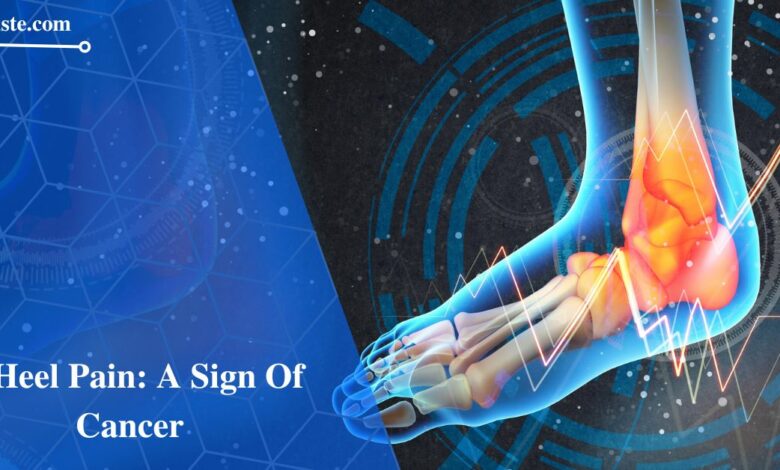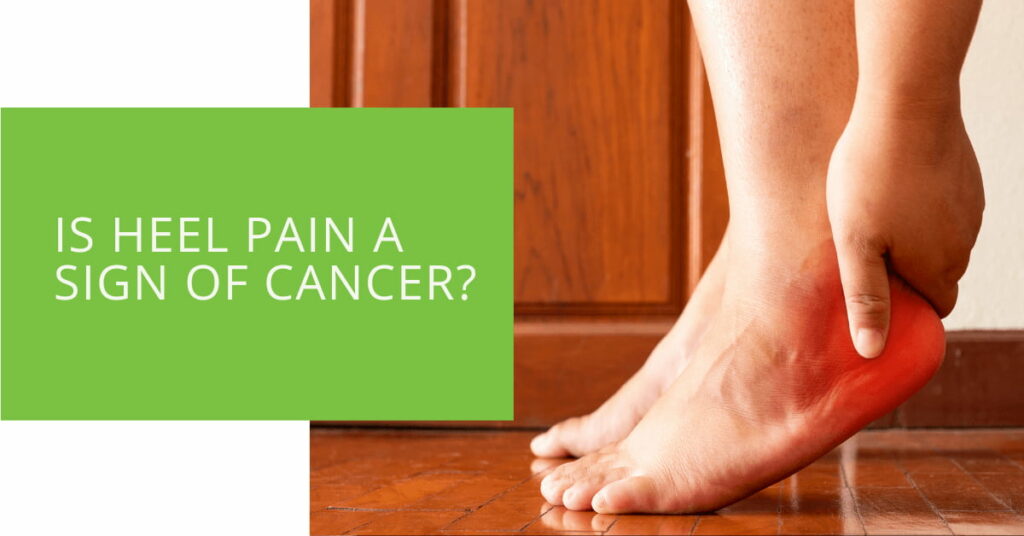Is Heel Pain: A Sign Of Cancer – Unveiled The Symptoms!

Heel pain can be caused by various factors, including injury, plantar fasciitis, or Achilles tendonitis, but it’s rarely associated with cancer. A healthcare professional evaluates persistent or severe heel pain to rule out serious conditions.
Let’s delve deeper into the reasons behind heel discomfort and put those concerns to rest.
Understand how is heel pain a sign of cancer – Check It!
Cancer rarely manifests as heel pain, but it’s crucial to recognize potential warning signs. Certain types of bone cancer, such as osteosarcoma or metastatic bone tumors, can affect the heel bone, leading to localized pain.

Soft tissue sarcomas may also develop in the heel’s surrounding tissues, causing discomfort. However, these instances are relatively uncommon compared to other causes of heel pain.
It’s essential to differentiate between benign conditions and potentially serious issues, seeking medical evaluation for persistent or worsening symptoms to ensure prompt diagnosis and appropriate treatment.
The Most Common Causes Of Heel Pain – Let’s Explore!
| Cause | Portrayal |
| Plantar Fasciitis | Inflammation of the plantar fascia, a thick band of tissue that runs along the bottom of the foot. |
| Achilles Tendonitis | Is Heel Pain: A Sign Of Cancer is inflammation of the Achilles tendon, which connects the calf muscles to the heel bone. |
| Heel Spurs | Bony growths that develop on the underside of the heel bone are often associated with plantar fasciitis. |
| Bursitis | Inflammation of the bursa, tiny fluid-filled sacs cushion the joints, commonly affecting the heel. |
| Stress Fractures | Is Heel Pain: A Sign Of Cancer often caused by repetitive stress or overuse, hairline cracks in the bone affect the heel area. |
| Tarsal Tunnel Syndrome | Compression of the tibial nerve as it passes through the tarsal tunnel leads to heel pain. |
| Sever’s Disease | Is Heel Pain: A Sign Of Cancer Common in children and adolescents, it involves inflammation of the growth plate in the heel bone. |
How Joint Is Heel Pain: A Sign Of Cancer? – Let’s Check!

Rare Occurrence:
- Cancer accounts for a small fraction of heel pain cases, with only a small percentage being attributed to malignancies.
- Among the diverse causes of heel pain, cancer-related issues represent a minority, making it an infrequent diagnostic consideration.
Types of Cancer Associated with Heel Pain:
- Certain bone cancers, such as osteosarcoma or metastatic bone tumors, may affect the heel bone, resulting in localized pain.
- These cancers can develop in the heel’s soft tissues, potentially causing discomfort.
Risk Factors and Indicators:
- Individuals with a history of cancer may be at a higher risk of experiencing cancer-related heel pain, mainly if there’s a history of bone or soft tissue malignancies.
- Heel pain that persists despite conservative treatments or is unexplained by common causes should prompt further evaluation, including consideration of malignancies.
Diagnostic Considerations:
- X-rays, CT scans, or MRI scans may be utilized to evaluate the heel for signs of bone abnormalities or soft tissue masses indicative of cancer.
- In cases where malignancy is suspected, a biopsy of the affected tissue may be necessary to confirm the diagnosis.
Read Also: Big Data Airline Thegreenforestresort. Co.Id – Let’s Explore!
The Treatment Options For Is Heel Pain A Sign Of Cancer – Let’s See!

Surgical Intervention:
Is Heel Pain: A Sign Of Cancer is that the cancerous growth is localized and operable; surgical removal may be recommended. This procedure aims to excise the tumor while preserving as much healthy tissue as possible. Surgeons may also perform reconstructive procedures to restore function and aesthetics.
Chemotherapy:
Chemotherapy involves the use of powerful medications to target and destroy cancer cells. It is often employed in metastatic bone tumors or soft tissue sarcomas affecting the heel. Chemotherapy may be administered alone or in combination with other treatment modalities.
Radiation Therapy:
Radiation therapy utilizes high-energy radiation beams to target and shrink cancerous lesions. It can effectively reduce pain and slow the progression of localized tumors in the heel region. Radiation may be delivered externally or internally, depending on the case’s specific circumstances.
Targeted Therapy:
Targeted therapy drugs target cancer cells while minimizing damage to healthy tissues specifically. These medications may treat specific bone or soft tissue cancers affecting the heel, particularly those with specific genetic mutations or biomarker expressions.
Palliative Care:
In cases where the cancer is advanced or incurable, palliative care focuses on alleviating pain and improving the patient’s overall comfort and quality of life. This multidisciplinary approach may involve pain management strategies, psychological support, and assistance with activities of daily living.
Rehabilitation and Supportive Measures:
After undergoing treatment for cancer-related heel pain, patients may benefit from rehabilitation services aimed at restoring mobility, strength, and function.

Physical therapy, occupational therapy, and supportive devices such as orthotics or prosthetics may be prescribed to aid recovery and adaptation to functional deficits resulting from treatment or disease progression.
Frequently Asked Questions About Is Heel Pain: A Sign Of Cancer
Is heel pain always a sign of cancer?
No, heel pain is not always a sign of cancer. Cancer-related heel pain is relatively rare compared to other causes. Heel pain is commonly associated with conditions such as plantar fasciitis, Achilles tendonitis, heel spurs, or bursitis.
What should I do if I suspect my heel pain may be cancer-related?
If you suspect your heel pain may be related to cancer, it’s crucial to seek prompt medical attention. Schedule an appointment with a healthcare professional, preferably a specialist such as an orthopedic oncologist or oncology physician, for a comprehensive evaluation.
What should I expect during a diagnostic evaluation for heel pain?
During a sign of cancer evaluation for heel pain, you can expect a thorough assessment by a healthcare professional. This typically involves a detailed medical history review, including any previous injuries or medical conditions related to heel pain.
Can lifestyle changes help alleviate heel pain?
Yes, lifestyle changes can help alleviate heel pain and promote healing. Simple measures such as wearing supportive footwear, maintaining a healthy weight to reduce pressure on the heels, and incorporating stretching and strengthening exercises for the feet and lower legs can be beneficial.
What are the potential complications of untreated heel pain?
Untreated heel pain can lead to several potential complications. Chronic inflammation and repetitive stress on the heel can exacerbate underlying conditions such as plantar fasciitis or Achilles tendonitis, leading to worsening pain and limited mobility.
Conclusion About Is Heel Pain: A Sign Of Cancer
Heel pain can be a distressing symptom; it’s essential to approach it with a balanced perspective and informed awareness. At the same time, cancer-related heel pain is relatively uncommon.
You can navigate any challenges with resilience and hope by staying proactive, advocating for your health, and embracing a holistic approach to well-being. Remember, you’re not alone on this journey; resources and support are available to guide you every step of the way.



